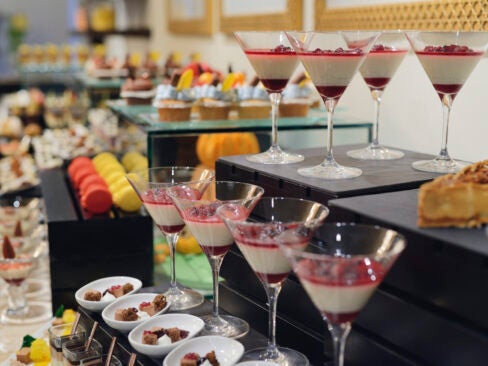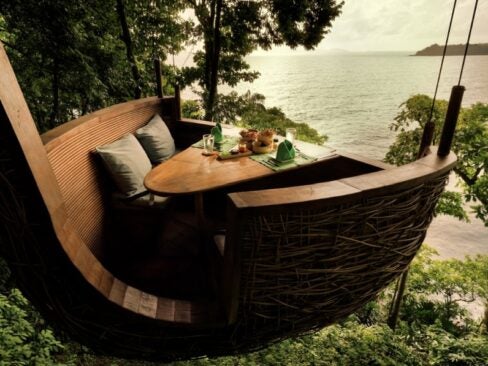Two decades on, the acclaimed seafood institution still maintains its three Michelin star rating and keeps a discerning clientele coming back for more. Here, he speaks to Elite Traveler about what it takes to get – and stay – firmly at the top.
 A protégé of fine dining legend Joël Robuchon, Eric Ripert has carved out an enviable culinary career since taking the helm of one of the Big Apple’s finest French restaurants, Le Bernardin.
A protégé of fine dining legend Joël Robuchon, Eric Ripert has carved out an enviable culinary career since taking the helm of one of the Big Apple’s finest French restaurants, Le Bernardin.
Congratulations on coming fifth in the Elite Traveler Top 100 Restaurants. This award is voted for by our jetsetting readers. How does it feel to be recognized by the public in this way?
We always appreciate it very much, and we always celebrate to some capacity. Which means a lot of champagne, usually! Because we don’t take anything for granted. And then, after that, we go back to work. We’re very happy to be in good company with Per Se and our other friends and it’s very good for us.
What is the secret to maintaining a globally successful restaurant over such a long period of time?
I think the commitment from the team, first of all. Because you have to create a team; by yourself you cannot do that much. To have a team as committed as you are. To reinvent yourself completely – every day almost – is very important, especially in New York because it’s a city that moves all the time and moves forward and you have to be willing to question yourself and reinvent yourself.
I was going to ask what has been your greatest challenge with Le Bernardin to date – I presume that has been one of them?
Well, the biggest challenge is to be consistent for everyone in the dining room. Because we want everyone to have the same experience day after day – not one day saying, ‘Oh wow, it was brilliant’ and going back and saying, ‘Oh my God, this sucks!’ (Laughs) You know? That requires organization and teamwork and we put a lot of effort into it.
 Yes, indeed. I know this is a bit of a weird question, but do you have a favourite dish on Le Bernardin’s menu?
Yes, indeed. I know this is a bit of a weird question, but do you have a favourite dish on Le Bernardin’s menu?
You know, I do not. And I’ve forced myself not to do so for years. I teach that to my cooks as well. As soon as you have a favorite dish, you are going to prepare that dish with much more focus and precision than a dish that you perceive as ‘not as good’.
So we make sure that we don’t have a favorite dish and we make sure that our menu changes a lot every year – about 80 per cent of the menu, 90 per cent of the menu changes in a one year period to make sure that we don’t get attached to anything.
Is there a dish that people might know you for? A signature dish?
Yes, we have one! We have one that we tried to take out of the menu for years. Usually when we change the menu, the clients very often complain. They’re like, “Oh, I’m gonna miss it, I’m gonna miss it” but that one, the one that we can’t take out, is the tuna carpaccio with foie grais.
I think people love it because it really represents what Le Bernardin is about: the fish is the star of the plate and it’s also really delicious with the surprising combination between foie grais and tuna.
Who do you rate as the top chefs in the world right now?
I always start by recognizing the talent and brilliance of my mentors. And Joël Robuchon is my mentor and I admire very much what he has been doing all over the planet at a very high level.
And then, living in New York obviously, I often see my friends: Daniel (Humm) and Jean Georges (Vongerichten) and Thomas Keller. Those guys are close to me because I see them very often and then, when I travel, I of course discover some new talent.
I’ve known Noma since they opened, but I still very much admire what they are doing there and there are very many, many other chefs that I admire. We have one of the best Japanese chefs in New York (who is) probably the most underrated genius of Japanese cuisine and that’s Masa. When I say underrated, I mean he has three Michelin stars! (Laughs)
And in a similar vein, who do you feel are the rising stars of the culinary world?
Again, it’s difficult for me to have a knowledge globally and to be fair about that. In New York, George Mendes (executive chef of Aldea), he is very talented. There is a chef of a restaurant that just opened in New York called Narcissa who is very talented, I think he’s going to go very far as well – his name is John Fraser. That guy is very good.
The food is almost like farm to table – inspired by farm to table… Very inspired by the seasons and what he finds in his own garden. And David Kinch, again he’s not a young kid, but I think he is a great talent. He has a restaurant called Manresa in California. He will definitely be more rewarded in the future.
On that subject, what is the best meal you’ve had in the past twelve months?
It’s really difficult to say… One of the best in the past twelve months was Masa in New York. Because he’s one of those Japanese masters who’s extremely precise in his cooking, very creative and, at the same time, keeps the Japanese tradition at its best. A good balance, for sure.
And finally, what is the future for fine dining, in your opinion?
Well, it’s to be less formal than it was twenty years ago – that’s a given, we all know that. Fine dining is about creating an experience for people and therefore, depending on where you are – you know, New York is very different to London and Paris and Tokyo and so on – I think it has to be excelling in terms of delivering a fantastic cuisine that is very unique – and delicious of course. It has to create an experience that you cannot find anywhere else and therefore you will remember your last meal in that place. And that is what fine dining is about.
(Image Credit: Nigel Parry/Shimon Tammar)








